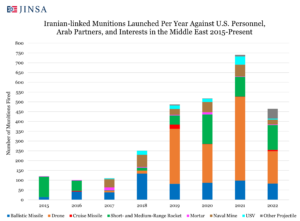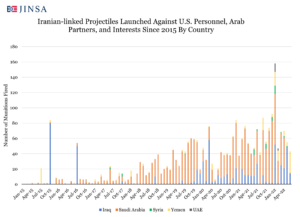Iran Summary – July 2022
About the Iran Summary: The Jewish Institute for National Security of America’s (JINSA) Gemunder Center produces a monthly tracker providing timely information and graphics illustrating Iran’s aggressive and destabilizing activities.
July 2022 Summary: After last month’s talks in Doha failed to produce a revived nuclear deal, Iran claimed it now has the “technical ability to build a nuclear bomb” but has not “made a decision” to do so. Iran and its proxies continue to destabilize the Middle East, as the Iran-backed Houthi rebels repeatedly violated the United Nations (UN) brokered truce in Yemen and Hezbollah launched multiple drones into Israeli airspace. Inside Iran, the regime’s campaign of repression has ramped up with mass executions, widespread arrests, and an order to more strictly enforce its mandatory hijab and chastity laws.
Response to Ukraine Crisis: Iran continues to support Russia’s invasion of Ukraine and its false narratives surrounding the conflict, expanding bilateral trade with heavily sanctioned Russia and reportedly planning to provide Russia with drones to replenish and expand its military capabilities.
- On July 11, U.S. National Security Adviser Jake Sullivan revealed that “the Iranian government is preparing to provide Russia with up to several hundred [unmanned aerial vehicles] UAVs, including weapons-capable UAVs on an expedited timeline.”
- JINSA has released an infographic examining how Iran’s weapons could replace Russia’s lost ISR drones in Ukraine and boost its capabilities by providing alternative means of targeting Ukrainian forces and launching from runways that are out of reach of Ukrainian strikes.
- Russian President Vladimir Putin visited Tehran on July 19, receiving support for Russia’s invasion of Ukraine from Iranian Supreme Leader Khamenei who claimed that if Russia had not taken the “initiative, the other side would have initiated the war.”
- On July 23, the spokesman of Islamic Republic of Iran Customs Administration (IRICA) claimed that Iran had exported commodities worth $115 million to Russia during the first quarter of the Iranian calendar year (March 21-June 21).
- Iran and Russia signed a Memorandum of Understanding on July 26 aimed at increasing the number of passenger flights between the two countries. A spokesman for the Iranian Civil Aviation Organization announced that a secondary agreement would follow providing Iranian aviation equipment, maintenance, and support to Russia.
Nuclear: After yet another round of negotiations failed to produce a revived nuclear deal in Qatar last month, Iran continues to insist they are willing to negotiate while simultaneously contravening efforts of the International Atomic Energy Agency (IAEA) to monitor their nuclear program.
- Iran added demands that have “nothing to do with the nuclear” deal during the Doha nuclear negotiations in late June and have made alarming progress in uranium enrichment, according to U.S. Special Envoy for Iran Robert Malley on July 5.
- On July 9, the IAEA reported that Iran had escalated its uranium enrichment at Fordow plant using advanced machinery that could produce UF6 enriched up to 20 percent.
- On July 18, former Minister of Foreign Affairs Kamal Kharrazi claimed Iran “has the technical ability to build a nuclear bomb” but has “not made a decision to build an atomic bomb.”
- The IAEA’s cameras will remain turned off until a nuclear deal is restored, said Iran’s Atomic Energy Organization on July 25.
- On July 22, IAEA chief Rafael Grossi said that Iran’s nuclear program is “galloping ahead,” while the IAEA has limited visibility on developments.
- On July 25, Iranian Foreign Ministry spokesperson Nasser Kan’ani insisted “Iran has not left the negotiating table” but would not act “emotionally” or “hastily” regarding a revived nuclear deal.
- On July 27, Mohammad Eslami, the head of Iran’s Atomic Energy Organization, announced the construction of a “completely indigenous and Iranian” nuclear research reactor in Isfahan.
- Axios reported on July 27 that White House Middle East coordinator Brett McGurk told a group of think tank experts that a revived nuclear deal with Iran is “highly unlikely” in the near future.
Regional Aggression: As nuclear talks remain in limbo, Iran has continued to employ its regional proxy forces to undermine stability in the Middle East. Throughout July, the Iran-backed Houthi rebels violated the UN-led truce in Yemen, and Hezbollah launched multiple drones into Israeli airspace. Iran has also escalated its aggression against the west, wrongfully detaining foreigners and sanctioning current and former Americans government officials for alleged support of Iranian opposition.
- On July 2, the Israel Defense Force (IDF) intercepted three drones launched by the Iran-backed Hezbollah terrorist group towards Karish gas field in the Israeli maritime zone
- Israel’s Defense Minister Benny Gantz revealed that Iran had been “methodically basing itself in the Red Sea” gathering “the most significant Iranian military presence in the area in the past decade, “which poses a “direct threat to international trade, energy supply, and global economy.”
- Britain’s Royal Navy revealed on July 7 that it had seized a shipment of Iranian weapons being smuggled through international waters south of Iran earlier this year.
- On July 15, Iran announced its first naval division that can carry and launch UAVs in the Indian Ocean.
- On July 16, Iran imposed sanctions on 61 more current and former American government officials for allegedly backing the Mujahideen-e-Khalq (MEK), an Iranian dissident group. Several experts affiliated with JINSA were among those sanctioned, including: JINSA Iran Project co-chair General Chuck Wald (ret.), Ambassador John Bolton, Senator Joseph Lieberman, General James Conway (ret.), and Ambassador Bob Joseph.
- Russian President Vladimir Putin, Turkish President Recep Erdogan, and Iranian President Ebrahim Raisi held a trilateral meeting on July 19, in which Iran and Turkey promised to strengthen bilateral ties. Khamenei, according to his office, warned Turkey against a renewed incursion into Syria.


Cyber:
Iran continued its global cyberterrorism campaign to undermine its enemies. Pro-Iranian cyberwarfare groups targeted Israeli infrastructure and government services and allegedly launched a “massive” cyberattack on Albania that forced the country to shut down all online public services and government websites for several days.
- On July 4, a pro-Iranian cyberwarfare group claimed responsibility for an attack on the Tel Aviv Light Rail.
- The Israeli Health Ministry revealed on July 17 that a pro-Iranian cyberwarfare group was responsible for an attack had temporarily blocked overseas access to the Ministry’s website.
Domestic/Human Rights: Iran has continued to escalate its campaign of repression in an effort to stamp out dissent. Over the past several weeks, Iran has introduced a series of measures limiting the freedoms of women, ordering stricter enforcement of its mandatory hijab laws, and banning women from appearing in advertisements. Iran has also intensified its persecution of its religious minorities, arresting members of both the Bahai and Christian communities.
- On July 6, Iranian TV claimed the IRGC had detained several foreigners for allegedly spying, including the Deputy Head of Mission at the British Embassy, Giles Whitaker. The UK countered these claims, stating that Whitaker had left the country six months earlier when his term ended.
- Poland confirmed that a Polish scientist had been detained in Iran on July 7.
- On July 11, Jafar Panahi, an award-winning Iranian filmmaker, was detained and ordered to serve six years in jail after he inquired after a fellow director who had been imprisoned for “disrupting the psychological security of society.”
- On July 11, Iranian security forces arrested at least 10 family members of individuals killed during the November 2019 nationwide protests, calling them “agitators” and “troublemakers.”
- On July 23, Iran carried out its first public execution since 2020, by hanging Iman Sabzikar, who was convicted of killing a police officer in Shiraz in February. According to Amnesty International, Iran had executed at least 251 people in 2022, as of July 27.
- Iranian security forces raided a home church gathering and arrested 12 Christian converts on July 17.
- On July 19, Iranian security forces arrested eight minority Bahais and took them to an undisclosed location.
- On July 23, Iran’s Headquarters for Enjoining Right and Forbidding Evil announced that sending videos to prominent Iranian activist, Masih Alinejad, would be punishable by up to 10 years in prison.
- On July 25, Radio Free Europe/Radio Liberty reported that Iran had banned the presence of women in advertising.
- On July 28, NYPD officers arrested a man with an AK-47 was outside the Brooklyn, New York home of prominent Iranian activist, Masih Alinejad.
- Iranian officials claimed they had arrested a Swedish citizen on espionage charges on July 30.
Recent JINSA Publications on Iran:
- July 20: “The Nuclear Deal That Biden Should Be Worrying About,” Blaise Misztal and Jonathan Ruhe, The Dispatch
- July 20: “US should draw in Israel, regional players for directed energy development,” Ari Cicurel and Lt Gen Henry A. Obering III (ret.), Breaking Defense
- July 27: “Infographic: Iranian UAVs Could Boost Russian Capabilities”
- July 28: “Infographic: Time (Keeps on Never) Running Out for Iran Nuclear Talks”
Recent JINSA Iran Nuclear Talks Updates: